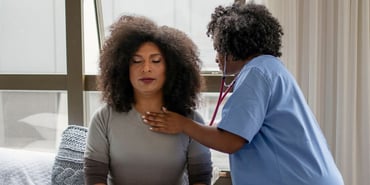
The FDA approved a colonoscopy prep tablet that may make it easier for patients as they prepare for a colorectal cancer screening procedure. Until now, patients had to spend at least a day preparing for their colonoscopy by drinking a gallon or so of a liquid laxative, followed by a lot of time in the bathroom.
If you know anybody who has prepared for a colonoscopy this way, it’s likely they remember this process rather well. Unfortunately, about one-third of patients usually don't drink all of the liquid prep, which means the results of the test may not be as accurate as they would be with a completely clean colon, or in some cases, the procedure has to be repeated.
The FDA approved a tablet alternative, SUTAB (sodium sulfate, magnesium sulfate, and potassium chloride), introduced by Sebela Pharmaceuticals. This tablet option makes colonoscopy prep a much easier process than before. It is the first colonoscopy prep tablet introduced in the US in the past ten years.
It's not a secret that people simply put off colorectal cancer screening because of the prep work’s reputation. The introduction of this tablet can help sway more people to go ahead and get screened on time. If you've been putting off a colonoscopy that’s been recommended by your doctor, perhaps this new prep tablet will encourage you to get it on the calendar. Here is more information about SUTAB to help you better understand the benefits it provides.
How SUTAB Works for Colonoscopy Preparation
SUTAB is classified as an osmotic laxative that clears the colon. Of course, clearing the colon is essential for getting an accurate screening, and taking the tablet will provide the same results as drinking the liquid. But the tablet doesn’t require the long and distasteful process of drinking the liquid!
SUTAB is a 24-tablet regimen that is simple to take. You'll be asked to take the pills by mouth starting the night before your scheduled appointment in what is called a "split dose.” This phrase just means that you take half of the total dose to start the cleanse and then the other half later to make the cleansing process a bit more tolerable and ensure that your colon is completely cleaned out before the exam. Research indicates that a split dose prep usually leads to a better cleanse.
You’ll still need to use the bathroom to clear the colon after taking the tablets. But you won’t have the process of drinking all the liquid.
When using SUTAB, your doctor will let you know if you can eat a light breakfast or a clear liquid diet before the procedure.
Who Should Use the Tablet vs. the Liquid Colon Prep?
As mentioned earlier, adequate bowel preparation is the key to a successful colonoscopy. It’s important to use the method that’s likely to work best for you.
A study published in 2020 showed that the SUTAB colonoscopy prep was 92% effective in bowel cleansing for a colonoscopy compared to 89% effectiveness of the liquid prep. This means that when used correctly, either one will achieve the goal of clearing the colon.
The liquid prep will be a bit grainy. If you’re sensitive to textures in liquid, the tablet may make it possible for you to prepare your colon for the procedure completely. Be sure you take the tablets at the times you’re prescribed.
If you don’t swallow pills easily, liquid prep may be a better option for you. Just be sure you take the entire dose.
When Should You Get Colon Cancer Screenings?
The American Cancer Society recommends that people at average risk of colorectal cancer start regular screening at age 45, with people considered to be in good health continuing screening until age 75. Screenings could include at-home stool-based tests or a visual exam, like a colonoscopy. The ACS recommends a colonoscopy at least every 10 years once you’re at the age of colorectal cancer screening if you don’t have a higher risk of colorectal cancer.
Individuals considered to be high-risk will likely be encouraged to schedule colorectal cancer screening outside of these guidelines. High-risk factors for developing colon cancer include:
- A close family member has been diagnosed with colon cancer
- You've had certain types of polyps removed during a past colonoscopy
- You've previously had colon or rectum cancer
- You've been diagnosed with inflammatory bowel disease (such as Crohn's Disease)
- You've been diagnosed with other genetic conditions
Related reading: What Are Colorectal Cancer Risk Factors, and Who Is at Risk?
Colonoscopies are always recommended if the stool tests show any indication of concern. That’s because they are the most successful in detecting early signs of colon cancer. Early detection often means more colorectal cancer treatment options and a higher success rate. Make sure to talk to your doctor to learn if you are in a high-risk category and when your screenings should begin.
6 Tips for Making Your Entire Colonoscopy Process as Successful as Possible
Here are a few things you can do to make the entire process easier, whether you’re using the tablet or liquid colonoscopy prep process:
- Eat foods low in fiber a day before you start your colonoscopy prep. Foods like white rice, saltine crackers, bananas, watermelon, and other foods that are less likely to kick your digestive tract into high gear.
- Avoid foods for a couple of days before the colonoscopy that could get stuck in the colon, even after the prep, such as nuts and seeds.
- Try to time your procedure so you’re not “hangry” by the time you’re done. If you usually eat breakfast because you’re hungry in the morning, it’s best to schedule an early colonoscopy. If you don’t eat till lunch most days, an afternoon procedure may be fine for you.
- Think about your schedule before choosing a date. If you want to take the test on a Monday, be sure you have a clear social calendar on the Sunday before. You won’t want to go far from home!
- If you’re going to use the liquid, chill the water you mix with the powder. Take all of it!
- If you’re using the tablets, don’t skip a dose and take the entire dose so that your colon will be clear and the test doesn’t need to be repeated.
Talk to Your Doctor About Colorectal Cancer Screening and Using a Prep Tablet
At Compass Oncology, we are committed to keeping you aware of the latest information that impacts your health. New and improved colonoscopy prep medications can significantly impact a person's willingness to participate in these life-saving screenings. We hope that learning about prep alternatives will give you the encouragement and confidence that you need to get your colon cancer screening completed this year.
We encourage you to check out this helpful resource for more information about screenings in the Portland and Vancouver area. Keep in mind most insurance plans will screen for free, and you can find local (Oregon-based) screening options for as little as $25 without insurance.
If you were recently screened for colorectal cancer, and your results came back abnormal, consult a medical oncologist for further testing to help determine the best next steps.
Originally published in March 2021. Updated May 2023.



